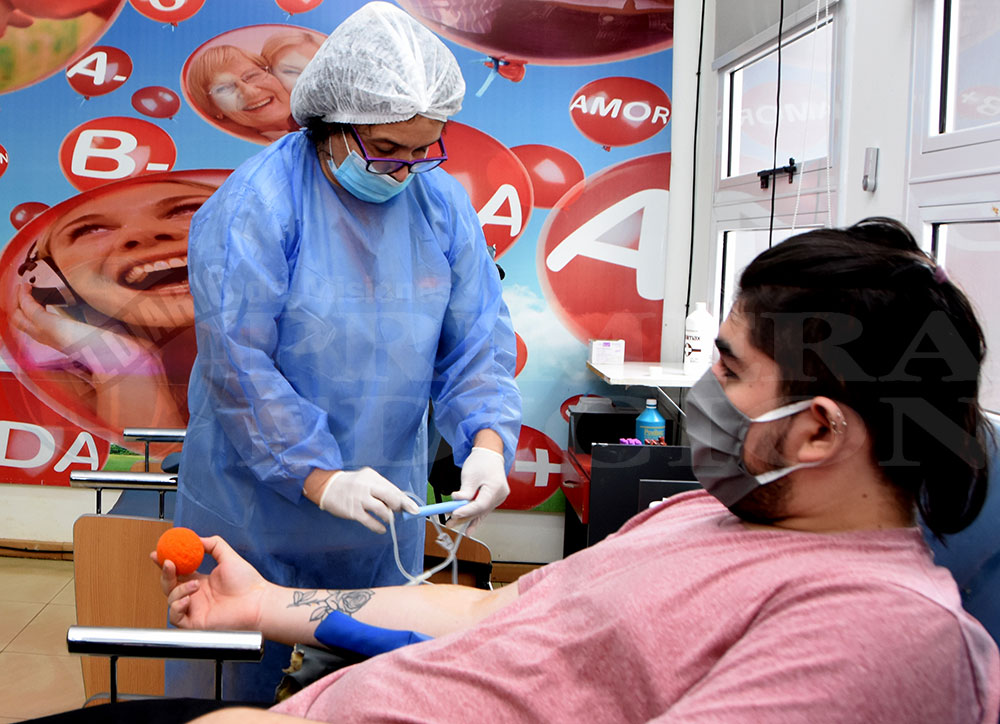BLOOD BANK. There are many voluntary blood donors who donate again after months.
–
For the care of medical emergencies and scheduled surgeries, the province maintains a permanent blood stock thanks to volunteers who constantly come to donate.
During the pandemic they had to adapt to the protocols and work with scheduled shifts with previous donors, although they always look for those interested in collaborating with extractions.
FIRST EDITION talked about it with the head of the Department of Production and Hemovigilance of the Blood and Biological Tissue Bank of Misiones, Alberto Krupp, who explained that it works with “programmed extractions of people who are generated a shift in both Posadas and Eldorado and Oberá. We try to have voluntary donors already registered to have a minimum stock ready for the daily demand of surgeries, the requirement in hospitals and private institutions where we have agreements ”.
Holy Week
In addition, Krupp remarked that “the province has a whole stock available, especially at Easter where we have several non-working days, to supply all hospitals in the most remote places. All the centers have a minimum provision for emergencies that require it ”.
However, he indicated that “After more than a year of starting the COVID-19 pandemic, we have had a decrease in blood donations and it is something that is seen all over the world. This is due to protocol, people’s fear, the reorganization of shifts and schedules to avoid crowding. Thus, there was a drop in the blood levels that we handle and today we are at 70% of the numbers of previous years ”.
The quality of the donation
Regarding serological discarding, Krupp specified that “we have seen a great advance in recent years in altruistic donation. In 2006, when the province adhered to the national blood plan under all regulations, we had a discard of 23% in people with reactive serology. Those numbers mainly included hepatitis B, syphilis and chagas as the most determining pathologies in Misiones. By rating the altruistic donor to be repeat, it was lowered to 3 or 4%. In this way, he is a previous and qualified donor, with quality blood. Our goal is to lower it even more ”.
Not everyone can donate
From the Blood Bank, Krupp assured that “The volunteers in the province are numerous and we try to ensure that the donors return after two or three months to always have the same quality of blood.”
While “we have a series of conditions because beyond the will to donate the person must be suitable. To do this, a series of questions is asked, for example if you had any communicable infectious disease; if you have cardiovascular problems; kidney; if he was in prison units; if you have recent piercings. Age is a determining factor because it has to be a person between 18 and 65 years old. In addition, it can have a relationship between the volume of blood and the weight or body mass that makes a donation unsafe and that is why it is requested to have more than 50 kilos. We also do a hemoglobin determination to know if it is not anemic, the pressure, temperature and pulse are taken”, He listed.
Withdrawals “are made in scheduled shifts through calls from the Bank to invite those who have already donated to continue doing so.”
In Posadas “Extractions are carried out from Monday to Saturday from 7 a.m. to 7 p.m., as in Eldorado and Oberá. We have external collections once a week in a different location in coordination with the corresponding Municipality. All this reaches Posadas to be distributed in the province “added.
Most requested variants
Regarding the most required variants, Krupp noted that “In the world population, 85% are RH + donors and 15% are RH -. In this sense, the province does not escape this reality and we are always behind the RH- people to have a stock if required. Currently all blood groups are important and we measure donors by blood quality, with a safe serology so as not to transmit any disease to the possible patient who needs it ”.
–


:quality(85)//cloudfront-us-east-1.images.arcpublishing.com/infobae/5BIGKMNVEZG45OTMDCMBN7XK3I.jpg)